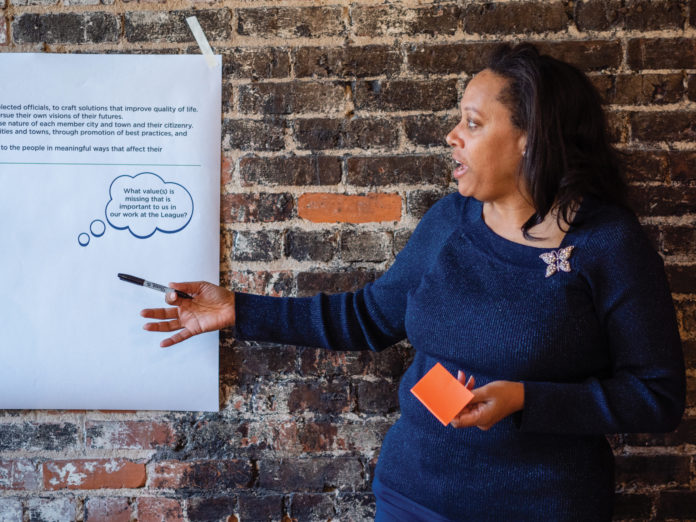Local Leaders are Uniquely Positioned to Address This Issue. The League is Here to Help.
Equity and equality. Not the same thing. A small lesson. But understanding that point clears up so much about the race conversation—one that, no matter the media focus or best efforts, still seems siloed.
Absorbing the core context and vocabulary is the essential step toward a better community conversation—one that municipal officials are keen to have as the issue holds its center in the national dialogue.
That’s why the League has launched DIRECT (Diversity, Inclusion & Racial Equity for Cities & Towns), a learning program for municipal officials and their power to strengthen their communities by identifying and addressing racial disparities at the local level. For its need of level conversation toward agreeable solutions, city and town leaders are uniquely tuned to the conversation, as sensitive and self-confronting as it may be.
“The topic of racial equity is very personal. Every person’s belief is founded upon our personal experiences and our education, where we’re from, what we’ve seen and witnessed, who we know,” said Cary council member and immediate past president of the League Jennifer Robinson when asked about DIRECT’s essence. “There are so many components of this and it does become a very personal matter. And we’re asking people to rethink the way that they perceive equity, and are equitable.”
DIRECT training comes two ways. The first is a consultation, which is a one or two-day engagement, where a city or town will go through the curriculum. The second way is for communities that may want to tackle an aspect of racial equity in a different way or seek additional tools, DIRECT offers a six-month program with other municipal members.
The four-part focus is on language, history, data, and practical solutions.
DIRECT is an immediate outgrowth of the work of the Task Force on the Impact of City Leaders on Racial Equity. The 14-member spread of municipal leaders, co-chaired by Cary Council Member Jennifer Robinson and Fuquay-Varina Commissioner William Harris, formed in summer 2020 after the murder of George Floyd and subsequent social reactions to address the conversation of racial equity and establish realistic conclusions about the roles of municipalities.
“How city leaders can impact racial equity in communities,” said Vickie Miller, Director of Learning and Development at the League and a facilitator of DIRECT, speaking about the focus of the task force. “They also looked at historical data and the impact of wealth inequality and the role that systemic racism plays in all that as well.”
Which prompts the distinction between equality and equity.
“The difference between racial equity and other ways of looking at equal society is that equality by its definition means ’sameness’—everyone is on the same level, everyone is starting from the same place, and that history and other circumstances have no role in that,” explained Miller. “And that has led to, particularly from a municipal standpoint … that policies and processes at the municipal level … actually may have caused harm or may be causing harm because everyone is not starting from the same place. History has had an impact on circumstances, particularly around race, unfortunately.”
Conversations of “equity” recognize the gulf in starting points, “Taking into account history, taking into account the circumstances that people in marginalized groups have experienced and how they’ve been impacted,” Miller said. “And identifying that and understanding that and looking at potential ways of directing resources and opportunities in a targeted way, so that that can be level. Until we understand that it does have an impact, we cannot have an equal society as our Constitution has set out.”
Winston-Salem city council member Jeff MacIntosh has participated in the Task force’s efforts, which served as the foundation for DIRECT’s subject matter.
 “There were times when it was very uncomfortable. But the reason I think it works so well is that right up front we were told it was going to be uncomfortable. And we were told the reasons why it was important for us to work through that discomfort, to be able to actually hear things and say things that we don’t feel comfortable doing on a day to day basis. But we were in a group where we all felt it was a safe place.”
“There were times when it was very uncomfortable. But the reason I think it works so well is that right up front we were told it was going to be uncomfortable. And we were told the reasons why it was important for us to work through that discomfort, to be able to actually hear things and say things that we don’t feel comfortable doing on a day to day basis. But we were in a group where we all felt it was a safe place.”
For MacIntosh, one of the most relevant points was that his community, like any, is talking about race, whether its council is or not.
“It’s important to have these conversations now. So as an elected official, you need to hear what people are actually thinking, and you need to hear it before it’s in a confrontational setting.”
He emphasized, “Even if you think it doesn’t exist in your community, it does. Put yourself in the position of being concerned without being defensive.”
DIRECT, in its education for elected officials, is data-backed, entirely based on historical events and numbers related to wealth, housing and access, with comparison points and informed conclusions.
“We’ve identified that the issues that city and town leaders are experiencing, whether or not they’re within their control, are showing up in our communities and have real impactful consequences. And we want our leaders to have a base understanding of that is the case, that is not by accident, that there usually is a historical basis for that.”
Put into an analogy, the equity discussion could be set in a game of Monopoly. Three players begin the game and begin buying up properties, utilities, and railroads. Late into the game, a new player joins—a scenario of inequity, with the latter-admitted player not able to compete in the development of wealth.
Traveling the difficult discussion of race in America, incidentally but for related reasons, may also lend to better dialogue on other, historically difficult issues, or to new challenges ahead.
“If we can normalize our approach to how we talk about race, so we can get to some really transformative change that impacts cities and towns, that would be great,” said Miller.
Find more information about DIRECT at www.nclm.org/Pages/Consulting/DIRECT.aspx.
















